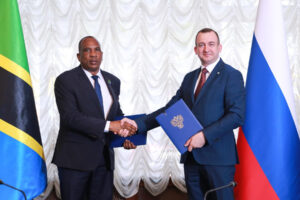- Russia and Tanzania unite to double trade, boost Africa market access
- History as Janngo Capital seals Africa’s largest gender-equal $78M tech VC fund
- South Africa Budget Disappoints Investors as Deficit Widens
- Kenya drops to 6th place in Africa trade barometer
- Tanzania’s bold move to boost cashew nut exports by 2027
- Chinese cities dominate global list of places occupied by billionaires
- Sudan tops up as Africa aims for $25 billion development fund
- Opportunities for youth: Tech firms Gebeya and NVIDIA to train 50,000 developers in Africa
Author: Laurence Sithole
I am a financial services professional with a strong background in diverse areas of banking. My skill set includes among others International Banking, Trade Finance, Commercial Lending, Customer Service, Finance, Banking, Corporate Finance, and Investment Banking. Africa is my home and I am passionate about its development,
This means that these individuals would not be able to access financial services from the banks for a period of up to two years. The matter is still unfolding, and further developments will be advised in due course.
Zimbabwe, after attaining the highest inflation record in world history and especially for a country that was not involved in an armed conflict, took the decision to demonetize its defunct currency in favour of a basket of foreign currencies led by the United States dollar.
After a period of relative economic stability, the country took the decision to reintroduce the Zimbabwe dollar initially as a surrogate currency known as the Zimbabwe bond note. This was a response by the monetary authorities to a shortage of foreign currency and bank notes.…
- Zimbabwe did not have a parallel market for foreign exchange in the years running from 2009 to around 2016.
- Zimbabwe is heavily reliant on imported products and expends more foreign currency than it can afford.
- Demand pressure has contributed to the fall of the Zimbabwe dollar resulting in general inflation.
To dollarize or not to dollarize?
This question has robbed monetary authorities of sleep as the Zimbabwe dollar falls precipitously on the parallel market.
Zimbabwe did not have a parallel market for foreign exchange in the years running from 2009 to around 2016.
It all began with the introduction of a surrogate currency that was fallaciously pegged at par with the United States dollar. The authorities initially posited that the surrogate currency was supported by a loan facility extended by the Africa Export-Import Bank (Afrexim Bank).
This loan it was said underscored the parity of the currency. It did not …
A Primer
McKinsey & Company, the global business consulting giant conducted a study on the slow pace of infrastructure development and financing in Africa and found overwhelmingly that: “More than anywhere else on Earth, Africa has huge unmet needs for infrastructure, reflecting a long history of underinvestment. Today the continent has the opportunity to build the infrastructure its people and businesses need—at speed and scale. The funding is available, together with a large pipeline of potential projects. To ensure that the money is spent where it is needed, and delivers high-quality infrastructure on time and on budget, governments and private sector players need to step up to prepare, plan, and manage projects with a new level of rigour and robustness.”
One of the findings from their research is that despite the pertinent need to develop infrastructure to be competitive globally African countries lag behind their worldwide counterparts when it comes…
In the US, cheap and accessible shale gas is rapidly displacing coal. And in China, concerns about poor air quality and related health issues have caused demand for coal to fall three years in a row, from 2014 to 2016. So is coal demand about to decline globally? Is coal headed for the ash heap of history? Such a development is unlikely.”
The relegation of coal to the dustbin of energy sources, the Boston Consulting Group (BCG) does not believe is likely. They are not the only ones who hold this view.
McKinsey & Company, another highly regarded consulting company, does not believe coal will not have a role in the energy mix of the world going forward. They are not as blunt in expressing their views as their counterparts at the BCG however. McKinsey & Company featured an article on their website proclaiming that the adoption and development of…
China had been funding the development and exploitation of massive coal reserves in countries like Indonesia and Vietnam under an initiative called the Belt & Road but has come under pressure as the world tries to honour its Paris climate agreements.
This Belt & Road initiative is a strategy initiated by the People's Republic of China that seeks to connect Asia with Africa and Europe via land and maritime networks with the aim of improving regional integration, increasing trade and stimulating economic growth.
To realize this vision required the use of natural resources which China does not have entirely but other nations do and would then secure supply of this through the development of resources such as coal mines in developing countries. The Chinese are reportedly developing a US$3 billion coal mine in the Hwange area of Zimbabwe.…
[elementor-template id="94265"]
A strong ESG proposition will enable a company to gain access to new markets and grow existing ones. As was reported in another article, “Doing Good is Good Business” certain aluminium producers were able to increase the margins on their products by eliminating carbon from their products and selling it to customers who are demanding more of that product.
For companies that rely on government contracts, having a comprehensive ESG proposition places them in good stead to receive increased business from governments of nations that are becoming more climate and green conscious.
According to leading business consultants when governing authorities trust corporate actors, they are more likely to award them the access, approvals, and licenses that afford fresh opportunities for growth.…
[elementor-template id="94265"]
Africa’s largest multinational companies are following the global trend that is in vogue – that of making ambitious goals and undertakings to reduce carbon emissions ahead of this month’s climate change conference to be held in Glasgow, Scotland.
Leading the pack is Africa’s largest lender by assets, the Standard Bank Group, which in October held a 2-day climate summit that was streamed online and ran under the theme ‘Africa’s Journey to Net Zero’. The summit was hosted in partnership with the Institute of International Finance (IIF) a global financial think tank which partners with financial services firms worldwide including the Standard Bank Group.
More specifically the Institute of International Finance is the global association of the financial industry, with over 400 members from more than 70 countries. Its mission is to support the financial industry in the prudent management of risks; to develop sound industry practices; and to advocate for
Firstly, environmental criteria which consider how well a company performs as a steward of nature. This includes the energy a company takes in and the waste that it produces and the consequences for humanity as a result.
This aspect of the criteria also encompasses carbon emissions and climate change which have become highly topical especially in the ongoing COP26 conference in Glasgow. This aspect of the ESG criteria is important because every company uses energy and it is affected by the environment.
The social criteria which is second considers how that company manages its relationships with stakeholders namely employees, shareholders, lenders, customers, suppliers, and the communities where it operates. This feature addresses the relationships a company has and the reputation it fosters in the communities it operates in which may include labour relations, diversity, and inclusion.…
[elementor-template id="94265"]
If your goal is financial success, then the investment is the vehicle that will get you to that destination. Having said that, many people just do not know the first thing about investing let alone investing in the stock market. Many appreciate the need and the urgency to invest for the future, but they come up short in terms of how to go about the business of investing in a practical manner. Unfortunately, this lack of understanding of this concept has seen many people fall prey to con artists who swindle them of their savings.
What does it mean to invest?
Investment basically means to place funds or resources into financial schemes, shares, property, or a commercial venture with the expectation of achieving a profit. Investopedia describes investing and investment as “…the act of allocating resources, usually money, with the expectation of generating an income or profit. You can invest
Anglo American, the mining behemoth took the decision on May 7th, 2021 to divest from its South African thermal coal and demerge its assets in this space into a separately listed entity that it chose to name Thungela Resources. The name “Thungela” comes from the Zulu word meaning to “ignite” or to “set alight” or to “set on fire”. This new mining outfit was formally demerged and listed on the Johannesburg and London Stock Exchanges on June 7th, 2021 and it presented its first set of interim financial results as a standalone entity in July. Its results exceeded expectations from the market which was quick to subscribe to its shares and doubled its share price over the course of the month. The company’s name seems very instructive given this background. It has literally set light to its shares by delivering a very impeccable set of numbers




